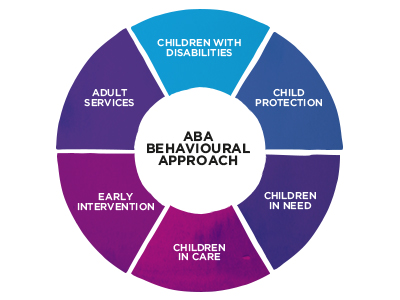
By Salvatore Cesare, Service Development Manager
The through-put dilemma
Moving cases forward to meet care planning objectives is essential to good social work practice.
Serious Case Reviews and internal practice analysis suggest that frontline team managers and social workers often work in isolation under the increasing burden of unmanageable caseloads and external scrutiny.
This often results in poor client outcomes, case drift, and the absence of essential through-put processes. This creates a ‘knock-on’ effect with new cases piling on top of old, placing further stress on social workers’ ability to meet the needs of children and families in their care.
The benefits of behavioural intervention
Most social work interventions are based on the notion of enhancing insight as a pathway to facilitating change.
However, when children and parents present with limited insight, most social workers would agree that behavioural therapy is uniquely suited to solve these embedded behavioural obstacles.
Unfortunately, affordable, evidence-based behavioural interventions are rarely available to statutory social work practitioners in Early Intervention, Children in Need, Children with Disabilities, Child Protection, and Children in Care service areas.
Applied behavioural analysis: a solution to stalled case progression
Applied Behaviour Analysis (ABA) was originally utilised in the treatment of individuals with autism, intellectual disability, and learning disability, however, it has many applications across different service areas. As ABA is not insight-based, it is likely to be more effective than social work interventions that are dependent on improving the service user’s understanding or insights into their own behaviour.
Beam ABA Services provides a unique, affordable and evidence-based behavioural treatment service for children and their parents or carers. Beam ABA is currently working with forward-thinking local authorities throughout Greater London and with proven rates of success (see diagrams below).
To date, Beam ABA has been exclusively working with Children with Disabilities services, but we are now expanding our services to treat families involved with Early Intervention, Children in Need, Child Protection, and Children in Care services, offering child-focused, parent-focused, and carer-focused behavioural treatment services.
Beam ABA can provide effective ABA services to children who fall short of diagnostic thresholds and are not eligible for programmes like Early Bird, Portage, and CAMHS.
Working in the family home, in schools, or in the community, our service is available days, evenings, and weekends. Key to the success of any programme is consistency and collaboration – we provide skilled and trained staff who focus is on socially significant outcomes achieved across location, across time and across people, including external stakeholders, schools and families. We are also developing an intensive in-home ABA driven parenting programme.
If you’d like further information, please call 020 8349 8024 or email contact@beamaba.com
www.beamaba.com | LinkedIn | Twitter | Facebook
Salvatore Cesare holds a master’s degree in social welfare with a strong clinical background as a seasoned clinician, program director, and clinical manager/supervisor with over fifteen years of field-tested expertise in mental health, substance misuse, traumatic brain injury, geriatrics, adolescent/family counselling, domestic violence, and homeless delivery systems. He currently works for Beam ABA services as a Service Development Manager.




 Bournemouth, Christchurch and Poole
Bournemouth, Christchurch and Poole  Hampshire County Council
Hampshire County Council  Lincolnshire County Council
Lincolnshire County Council  Norfolk County Council
Norfolk County Council  Northamptonshire Children’s Trust
Northamptonshire Children’s Trust  South Gloucestershire Council
South Gloucestershire Council  Wiltshire Council
Wiltshire Council  Wokingham Borough Council
Wokingham Borough Council  Children and young people with SEND are ‘valued and prioritised’ in Wiltshire, find inspectors
Children and young people with SEND are ‘valued and prioritised’ in Wiltshire, find inspectors  How specialist refugee teams benefit young people and social workers
How specialist refugee teams benefit young people and social workers  Podcast: returning to social work after becoming a first-time parent
Podcast: returning to social work after becoming a first-time parent  Podcast: would you work for an inadequate-rated service?
Podcast: would you work for an inadequate-rated service?  Family help: one local authority’s experience of the model
Family help: one local authority’s experience of the model  Workforce Insights – showcasing a selection of the sector’s top recruiters
Workforce Insights – showcasing a selection of the sector’s top recruiters 

 Facebook
Facebook X
X LinkedIn
LinkedIn Instagram
Instagram
This piece on ‘ABA to the rescue’ is heading towards the absurd. ABA was never designed for Mental health problems (therapy for). There is no evidence for it! To say it would help thru-put is so fanciful. ABA is a disputed therapy used for Autism. It is a rough approach and as an Autistic person myself, I would never wish it upon anybody. He is alo wrong about social wrokers using insight therapy (which he then says does not work or is inappropriate). Social workers do not use insight therapy or psychotherapy at all in UK. The use of any so called insight therapy within Mental health social work would be very rare. The fact that Community Care carry this silly article is a bit odd, as there is no critique of it. I am a psychotherapist (not insight orientated), I am a social worker or was, and I am Autistic. There is, I repeat, no evidence base for ABA with the vast majority of work that social workers do in the U.K. And the idea that social workers use (or prefer) ‘insight therapy’ is simply wrong. In fact this is actually an ad by a ABA company (Beam) dressed up like an article. ABA also has no evidence base in child protection, etc. Again its a disputed over-hyped Autism ‘treatment’. One I would never recommend anyhow.